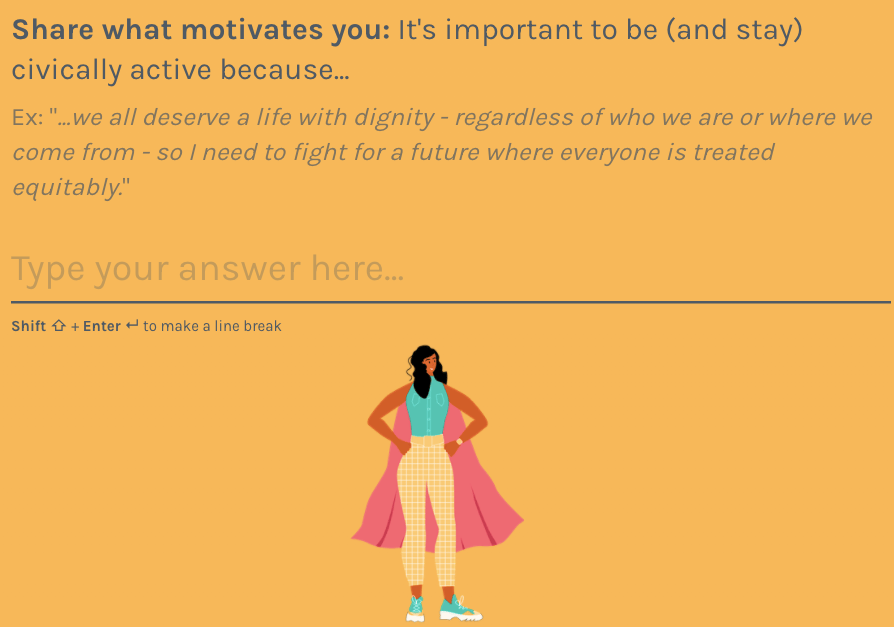Silver linings are hard to come by in 2020. But from our perspective, there’s at least one: this is the year millions of Americans discovered their civic voices – speaking out in person and virtually, at the polls and in the streets, and by volunteering in their communities at historic levels.
Voter turnout smashed records. Election-related volunteering and get-out-the-vote efforts surged. Take the example of Power the Polls, an initiative launched to address the pandemic-induced poll worker shortage, which reported a remarkable 700,000 sign-ups.
Where could all of this civic momentum take us?
In past years, the answer has been: nowhere. Civic engagement tends to rise during a contentious election season and then drop off after results are tallied. It becomes a blip rather than a pattern.
For Americans who want to have an ongoing, meaningful impact on shaping policies and programs, this approach is ineffective. That’s why our civic engagement team is focused on cultivating habits of civic engagement that go beyond turning out voters in a single election. We’re designing solutions that expand how people engage with their communities, maintain a sense of empowerment, and connect their civic actions to actual impact. Someone who has a habit of civic engagement might then be quicker to participate in peaceful protests, attend a town hall meeting, or volunteer in their neighborhood – and would certainly be more likely to vote in future elections.
This year, millions of Americans took the first steps to building a habit of civic engagement. And this year, we have an opportunity to change the historical pattern of rising and falling participation in the U.S.. Using insights from behavioral science, we can harness the civic energy we have today to mobilize our future selves.
Social scientists have long wondered how we can better compel our future selves to do the things we desire in the present. Our Sunday afternoon self, for instance, may intend our Monday morning self to wake up early for a run. We know how good it will make us feel, and how good it is for us. But when Monday morning comes, we ignore the feeble protestations of our past self, and decide to sleep in for another hour.
Like exercise, civic activism not only feels good, but it’s good for us (and for democracy). Some of us may have felt a surge of energy after voting, volunteering, or attending a protest with an accompanying conviction: I want to do that again. But in the days and weeks afterwards, it becomes harder to access that warm glow. As that emotional energy becomes more distant, so, too, does our motivation to take action again.
Luckily, behavioral science provides tools to transform present intentions into future actions – to narrow the psychological distance between what we want today and what we’ll do tomorrow. We know that making a clear plan about what you want to do – including the nitty-gritty details of how, when and where you’ll do it– can make it more likely that you’ll follow through. Making a clear, formal, and public commitment to your plan, creating well-timed reminders, and writing yourself a motivational message for future retrieval are other ways to influence your future self.
But if that sounds like a lot of work, there’s some good news: we’ve already done a lot of it for you.
Meet the Civic Action Time Capsule – a tool that allows you to capture how and why you got involved in 2020, recall the excitement of this moment, and send a message to your future self.
The idea is to capture your current sentiment , and use it to propel you forward in the future. In 2022 (the next major federal election year in the United States), the Time Capsule will send your present-day reflections to your future self as a reminder of your motivations this year, hopefully inspiring yourself all over again.
Now we realize you’re probably eager to forget 2020 ever happened. But forgetting can be a form of loss: we lose what we’ve learned about ourselves – our resilience, our fortitude, in the face of societal and personal catastrophe. Instead of forgetting, why not capture the most rewarding parts of 2020? In holding on to some memories, you might gain a valuable perspective: if you surmounted such formidable challenges once, you can do it again.
This month, with partners like Vote.org and others, we’re encouraging as many people as possible to create their own Time Capsules and harness their motivation from this historic year to inspire continued civic action for years to come.



